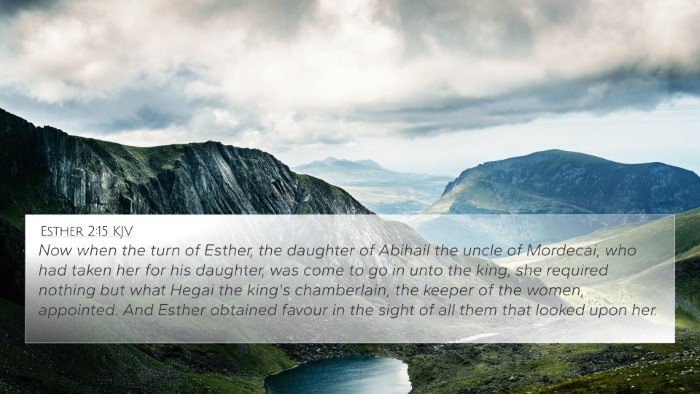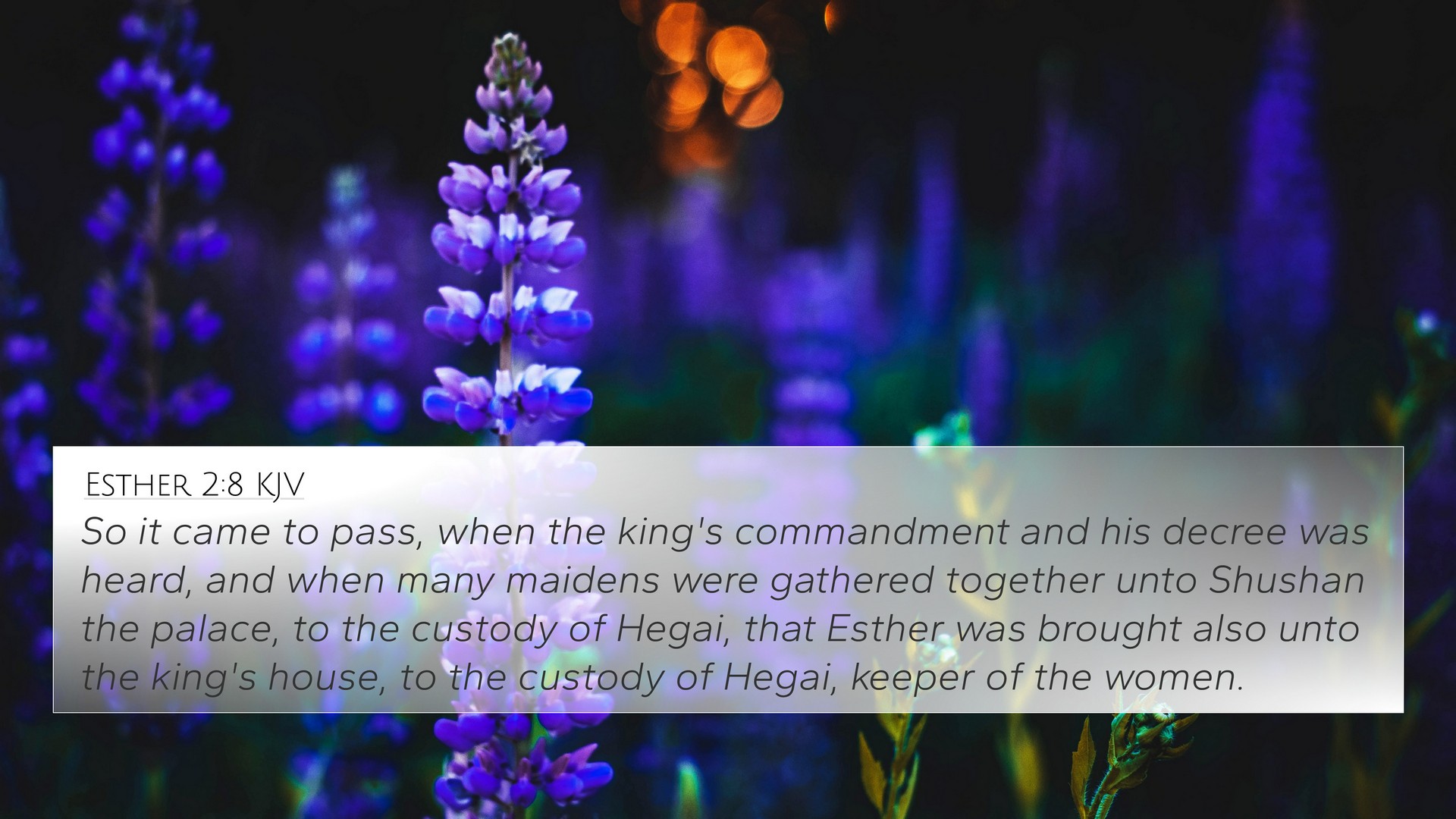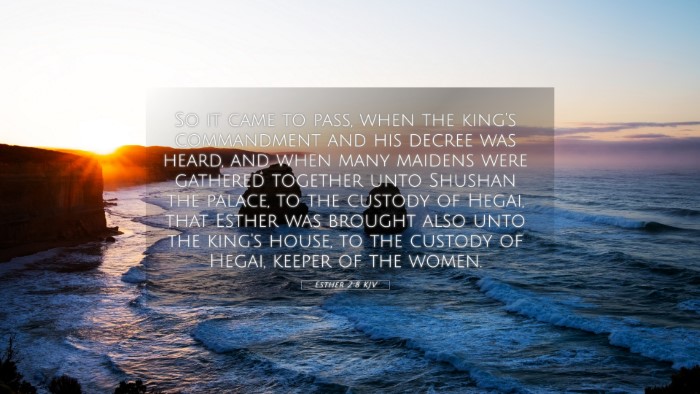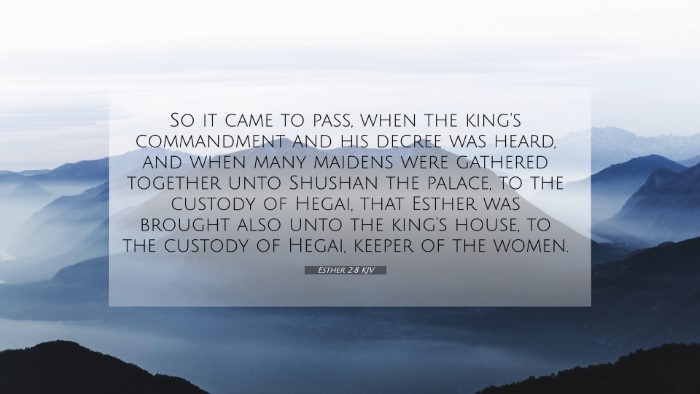Old Testament
Genesis Exodus Leviticus Numbers Deuteronomy Joshua Judges Ruth 1 Samuel 2 Samuel 1 Kings 2 Kings 1 Chronicles 2 Chronicles Ezra Nehemiah Esther Job Psalms Proverbs Ecclesiastes Song of Solomon Isaiah Jeremiah Lamentations Ezekiel Daniel Hosea Joel Amos Obadiah Jonah Micah Nahum Habakkuk Zephaniah Haggai Zechariah MalachiEsther 2:8 Similar Verses
Esther 2:8 Cross References
So it came to pass, when the king's commandment and his decree was heard, and when many maidens were gathered together unto Shushan the palace, to the custody of Hegai, that Esther was brought also unto the king's house, to the custody of Hegai, keeper of the women.
Uncover the Rich Themes and Topics of This Bible Verse
Listed below are the Bible themes associated with Esther 2:8. We invite you to explore each theme to gain deeper insights into the Scriptures.
Esther 2:8 Cross Reference Verses
This section features a detailed cross-reference designed to enrich your understanding of the Scriptures. Below, you will find carefully selected verses that echo the themes and teachings related to Esther 2:8 KJV. Click on any image to explore detailed analyses of related Bible verses and uncover deeper theological insights.

Esther 2:3 (KJV) »
And let the king appoint officers in all the provinces of his kingdom, that they may gather together all the fair young virgins unto Shushan the palace, to the house of the women, unto the custody of Hege the king's chamberlain, keeper of the women; and let their things for purification be given them:

Esther 2:15 (KJV) »
Now when the turn of Esther, the daughter of Abihail the uncle of Mordecai, who had taken her for his daughter, was come to go in unto the king, she required nothing but what Hegai the king's chamberlain, the keeper of the women, appointed. And Esther obtained favour in the sight of all them that looked upon her.
Esther 2:8 Verse Analysis and Similar Verses
Understanding Esther 2:8
Esther 2:8 reads:
"So it came to pass, when the king's commandment and his decree was heard, and when many maidens were gathered together unto Shushan the palace, to the custody of Hegai, that Esther was brought also unto the king's house, to the custody of Hegai, keeper of the women."
This verse serves as a pivotal moment in the Book of Esther, introducing Esther's transition from a Jewish maiden to a potential queen. The narrative highlights God's providence and the unfolding of His plans through what might seem like ordinary circumstances.
Commentary Insights
-
Matthew Henry's Commentary:
Henry emphasizes the divine orchestration in Esther's selection. Esther’s inclusion among the gathered maidens underlines God's sovereign choice, suggesting that even in perilous times, God prepares key individuals for leadership roles.
-
Albert Barnes' Notes:
Barnes notes the cultural implications present in Esther’s transition to the king's palace. He discusses the significance of Esther's beauty and character, suggesting that they played a vital role in her being chosen from among many to stand before the king.
-
Adam Clarke's Commentary:
Clarke brings attention to Hegai's role as the keeper of the women. He posits that Hegai’s guidance and favor toward Esther were critical in her preparation and acceptance in the royal court, implying a mentorship dynamic.
Thematic Connections
Esther 2:8 can be seen as a bridge connecting various themes within the Bible, particularly concerning God's providence, identity, and the role of women in Scripture. The following ideas emerge from this analysis:
- Divine Providential Care: Just as God orchestrated events in Esther's life, similar patterns are observed in other biblical narratives, including Joseph's rise in Genesis 37-50 and Moses' adoption and leadership in Exodus.
- Identity and Purpose: Esther's journey reflects a deeper theme of identity grounded in faith, paralleling narratives like Ruth (Ruth 1:16) where personal choice and divine purpose converge.
- Courage and Advocacy: Esther's role as an advocate for her people resonates with the actions of Deborah in Judges 4 and 5, highlighting female leadership in critical times.
Cross-References to Esther 2:8
This verse can be cross-referenced with several other Scriptures that enhance understanding:
- Esther 4:14 - "For if you remain completely silent at this time, relief and deliverance will arise for the Jews from another place..." (discusses God's providence)
- Genesis 50:20 - "(As for you, you meant evil against me, but God meant it for good.)" (similar divine oversight and purpose)
- Daniel 2:21 - "And He changes the times and the seasons; He removes kings and raises up kings..." (God's sovereignty in leadership)
- Ruth 1:16 - "But Ruth said: 'Entreat me not to leave you, or to turn back from following after you...'" (commitment and identity)
- Proverbs 21:1 - "The king's heart is in the hand of the LORD, like the rivers of water; He turns it wherever He wishes." (God's control over rulers)
- Galatians 4:4 - "But when the fullness of the time had come, God sent forth His Son..." (illustrating the importance of timing in God's plan)
- Hebrews 11:32-34 - "And what more shall I say? For time would fail me to tell of Gideon and Barak and Samson and Jephthah..." (celebrating acts of faith)
Concluding Thoughts
Esther 2:8 serves as a powerful reminder of how God is at work in the lives of individuals, orchestrating events for a greater purpose. Through a comparative Bible verse analysis, believers can see connections not just within the Book of Esther but across the entirety of Scripture.
Tools for Cross-Referencing: Utilizing a Bible concordance and cross-reference guide can enhance understanding of scripture connections. Delving into thematic studies offers a pathway for deeper engagement, allowing believers to fully grasp the inter-Biblical dialogue present within verses like Esther 2:8.


